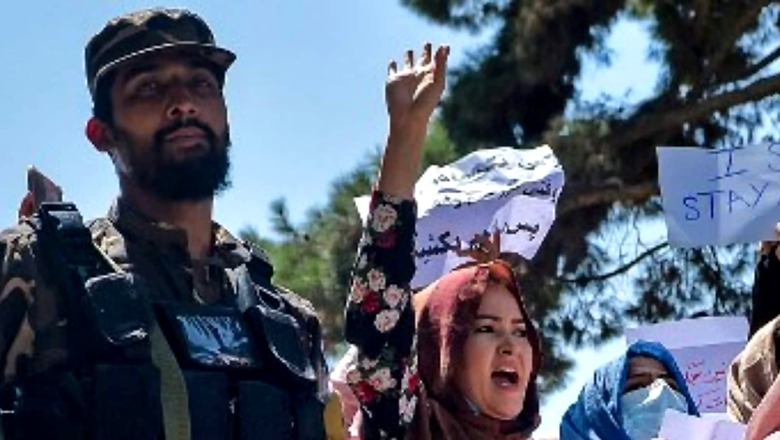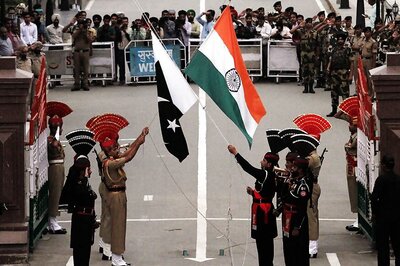
views
A Taliban spokesperson on Friday said that women should not become ministers and that they should only give birth. “A woman can’t be a minister, it is like you put something on her neck that she can’t carry. Not necessary for women to be in the cabinet, they should give birth. Women protesters can’t represent all women in Afghanistan,” Taliban spokesperson Sayed Zekrullah Hashimi told TOLO news.
Bearing testimony to the statement, earlier this week, two Afghan journalists were beaten in police custody after covering a protest by women in Kabul where they were detained by the Taliban.
Zaki Daryabi, founder and editor-in-chief of the Etilaat Roz newspaper, shared images on social media of two male reporters, one with large, red welts across his lower back and legs and the other with similar marks on his shoulder and arm.
Both men’s faces were also bruised and cut in the pictures, which were verified by Reuters. Under the first Taliban rule, women were banned from work and education. The group has said in recent weeks that women will be allowed to work and attend university within the parameters of Islamic law.
The United Nations Refugee Agency says about 80 per cent of those who have fled since the end of May are women and children. One anonymous Afghan woman wrote in The Guardian: “I did not expect that we would be deprived of all our basic rights again and travel back to 20 years ago. That after 20 years of fighting for our rights and freedom, we should be hunting for burqas and hiding our identity.”
Several Afghan women journalists have said they were not allowed to work by the Taliban. Shabnam Khan Dawran, an anchor at RTA (Radio Television Afghanistan), said she could not enter her office. “I wanted to return to work, but unfortunately they did not allow me to work. They told me that the regime has changed and you cannot work,” Dawran was quoted as saying by Tolo News.
Another journalist Khadija also said she was not allowed by the Taliban to enter her office. “We talked with our new director who has been appointed by the Taliban… There has been a change in the programmes. They broadcast their desired programs, there are no female presenters and female journalists,” Khadija said, according to Tolo News.
UN chief Antonio Guterres has warned of “chilling” curbs on human rights under the Taliban and mounting violations against women and girls.
Freedoms granted to Afghan women will definitely be stripped away by the Taliban — despite the group’s claims that they will respect women’s rights, said a Brookings Institution researcher.
Sanam Naraghi Anderlini, founder and chief executive of the International Civil Society Action Network, which has partner organizations in Afghanistan, said she had received reports in recent days that women who tried to go to work at public-facing jobs in the western city of Herat were told to return home.
Reports have emerged in recent days of families being forced to hand over their daughters to marry Taliban fighters in areas controlled by the militant group. Taliban spokesman Mujahid called the allegations false, the Wall Street Journal reported.
After they took control of Afghanistan in 1996, the Taliban brought in a harsh regime of governance that was founded on a strict interpretation of Islamic sharia law. One of the worst affected by the arrival of the Taliban were women, who suddenly found themselves virtually shut out from society as they were barred from stepping out without a male escort and wear anything other than the burqa, which covered them from head to toe. Girls were prevented from attending schools with education deemed to be not necessary for them as women were banned from taking up employment.
The system of Islamic courts handed out punishments like whipping in public for violation of Taliban diktats while crimes like adultery could condemn those found guilty to death by stoning.A report by rights group Human Rights Watch (HRW) last year said that before the Taliban seized Kabul in 1996, “women accounted for 70 per cent of all teachers, about 50 per cent of civil servants, and an estimated 40 per cent of medical workers”. They did exempt women health workers — and many organisations are said to have reclassified their women employees as medical staff — but restrictions on travel and the stipulation of a male family member needing to accompany them effectively prevented women from keeping any jobs.
“The Taliban’s rights record was characterised by systematic violations against women and girls; cruel corporal punishments, including executions; and extreme suppression of freedom of religion, expression, and education,” HRW said.
Read all the Latest News, Breaking News and Assembly Elections Live Updates here.



















Comments
0 comment